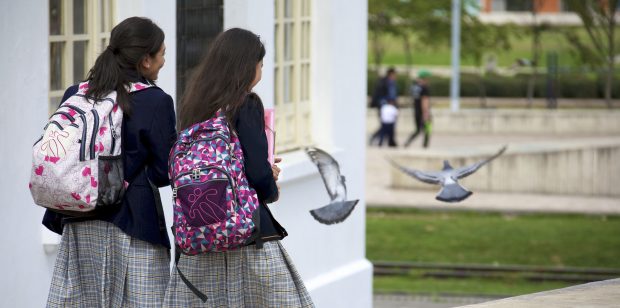
Today’s Education in the Media blog looks at today’s report from the Higher Education Policy Institute (HEPI), the launch of the first modern foreign languages centre for excellence, the apprenticeship levy, teaching bursaries and home learning.
Selective Schools
Today, Thursday 10 January, the HEPI has released a report on the impact of selective schools on progression to higher education. This has been covered by Sky News, the Times, the I News, the Telegraph and the Daily Mail.
Findings include that 45% of pupils at grammar schools come from households with below median income and that 39% of pupils in selective school areas progress from state schools to highly-selective universities, compared to 23% in comprehensive areas.
In December we announced the 16 schools who have been successful in their applications for the Selective School Expansion Fund – these schools showed a clear vision and ambition to widen access for disadvantaged pupils, and will therefore be a share of the £50 million funding to support them in achieving this. The second round of the fund will launch next month.
A Department for Education spokesperson said:
Selective schools are some of the highest performing schools in the country and an important part of our diverse education system. Almost all of them are rated Good or Outstanding, and they are popular with parents.
That is why we continue to support their expansion, through the Selective School Expansion Fund, where they meet the high bar we have set for working to increase the admission of pupils from disadvantaged backgrounds.
Modern Foreign Languages
Today, Thursday 10 January, the Schools Standards Minister Nick Gibb has announced the University of York as England’s first modern foreign languages (MFL) centre for excellence. This received coverage from TES and Schools Week.
The centre of excellence is backed by £4.8 million in funding and will coordinate the work of nine MFL hub schools across the country, to promote pioneering teaching practices and encouraging uptake.
School Standards Minister Nick Gibb said:
It is important to equip all young people, regardless of their backgrounds, with the language skills this country needs as an outward looking global nation.
In the application process the University of York demonstrated that it has the vision and expertise to be at the forefront of the work to improve the way in which foreign languages are taught in schools and to increase the take up of languages at GCSE.
The hubs are already having a positive impact and this direction will help them go from strength to strength.
Apprenticeship Levy
Today, Thursday 10 January, the City & Guilds Institution put out a report looking at how employers are using the apprenticeship levy. This report was covered by the Times.
Our apprenticeship programme has been designed to be employer-driven and in response to feedback, we made the levy more flexible by introducing transfers in April 2018, allowing levy-paying organisations to transfer up to 10% of the annual value of funds entering their apprenticeship service account to other employers. This will increase to 25% from April 2019.
A Department for Education spokesperson said:
The apprenticeship levy gives employers flexibility to provide their staff with a huge range of apprenticeship training opportunities. It helps them to get the skills their business needs, in occupations from accountancy through to bricklaying, and at levels from GCSE-equivalent all the way up to degree apprenticeships.
We are continuing to work with employers to build awareness on how businesses can use their apprenticeship levy fund. Businesses can now transfer up to 10% of their levy funds to other employers – this will be increasing to 25% from April 2019. We continue to work with business to make sure they make best use of the levy transfer and their own levy funds.
Teaching Bursaries
Today, Thursday 10 January, the Guardian published a piece which on teacher training bursaries. The piece focuses on analysis from the Labour party which suggests that teacher training bursaries are ineffective.
There are more than 450,000 teachers in our schools, which is 11,900 more than in 2011 – with increasing numbers returning to the profession. The Education Secretary’s top priority is to ensure that teaching remains and attractive and fulfilling career.
Tax-free bursaries worth up to £26,000 for trainees in priority subjects is one of several financial incentives encouraging the recruitment of high quality teachers.
Our strategy to drive recruitment and retention will address a wide range of areas including workload, development and flexible working – this is vital to building the best teaching workforce possible for the future.
Schools Standards Minister Nick Gibb said:
We do not agree with these comments: our bursaries and scholarships are not just an exercise in increasing teacher numbers. They are specifically tailored so that we attract the right candidates for certain vital subjects and developed with bodies such as the Institute of Physics and the Royal Society of Chemistry. This is especially important in a competitive graduate labour market with unemployment at its lowest level since the 1970s.
In addition to these bursaries, we are working with school leaders and unions on a strategy to drive recruitment, boost retention and strip away unnecessary workload, to ensure that teaching remains an attractive and fulfilling profession.
Home Learning
Today, Thursday 10 January, the Telegraph ran a brief article about the impact of reading on children’s learning, with reference to a report from the Nuffield Foundation.
The report suggests that children whose parents or carers regularly read with them are better at expressing themselves and understanding language. The Government has been working with experts such as the National Literacy Trust and Save the Children to develop a set of easy, everyday activities for all families, from playing with numbers to songs and poems.
The Education Secretary spoke about this at the Home Learning Environment summit in November.
Follow us on Twitter and don't forget to sign up for email alerts.